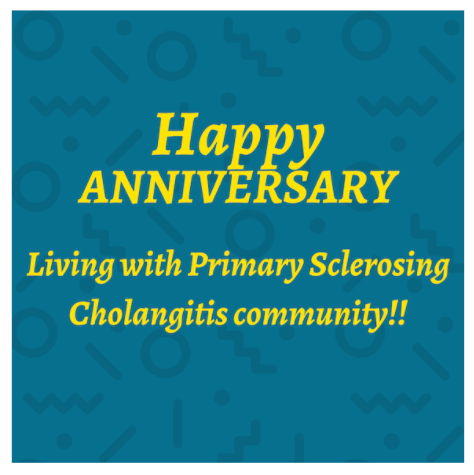
Primary sclerosing cholangitis is a rare disease that affects the bile ducts of the liver. Normally, when the liver cells secrete bile, it is collected by a system of ducts that flow from the liver through the right and left hepatic ducts. These ducts ultimately drain into the common hepatic duct. The common hepatic duct then joins with the cystic duct from the gallbladder to form the common bile duct. This runs from the liver to the duodenum (the first section of the small intestine). However, not all bile runs directly into the duodenum. About 50% of the bile produced by the liver is first stored in the gallbladder. This is a pear-shaped organ located directly below the liver. Then, when food is eaten, the gallbladder contracts and releases stored bile into the duodenum to help break down the fats.
PSC causes inflammation and scarring to the bile ducts which blocks the flow of the bile and eventually damages the liver. PSC is a progressive disease, which means it gets worse over time. Affected individuals may not experience any symptoms at first, this is especially true for kids who were diagnosed after some abnormalities were found in their blood test. In this case, patients are able to live a relatively normal life for many years, only having to visit their doctor a few times a year to monitor the progress of their disease.
Some of the early symptoms of PSC include fatigue, itching, abdominal discomfort, and jaundice (eyes and skin turning yellow). Later on, patients may suffer from fever with chills and night sweats when the bile ducts are infected. People in the advanced stages may suffer from liver failure and require an organ transplant.
There is currently no cure for primary sclerosing cholangitis. If your bile ducts are narrowed or blocked, your doctor may use medical procedures, such as endoscopic retrograde cholangiopancreatography (ERCP) and percutaneous transhepatic cholangiography, to open them and help keep them open. Your doctor may recommend over-the-counter products and medicines or prescribe medicines to treat itchy skin. Over-the-counter products and medicines include:
- skin creams and lotions that contain camphor, menthol, pramoxine, or capsaicin. Antihistamines such as Fexofenadine
- For mild itchy skin, your doctor may prescribe hydroxyzine. For severe itchy skin, your doctor may prescribe cholestyramine.
If you have low levels of fat-soluble vitamins in your body, your doctor may recommend dietary supplements of vitamins A, D, E, and K. Follow your doctor’s instructions on the type and amount of vitamins you should take.
A liver transplant is the only procedure that can actually cure PSC. Although there is still a possibility of recurrence after transplant, advancements in the understanding of PSC and transplantation have brought the recurrence rate down.
Through the years since its founding in 2010, the Living with Primary Sclerosing Cholangitis community has provided a safe and supportive online community for people affected by PSC. Patients and caregivers learn to advocate for their or their loved one’s health. They find out about how others respond to certain treatments including those that have better helped ease their symptoms. In the community, they also freely express their fears and worries, knowing that others understand exactly what they are going through.
If you or someone you know is affected by Primary Sclerosing Cholangitis, we invite you to join our Living with Primary Sclerosing Cholangitis community.

